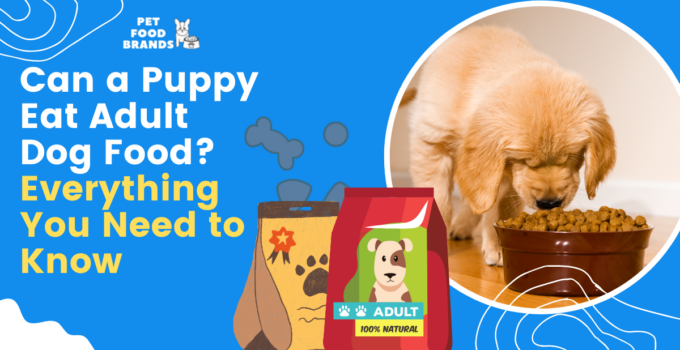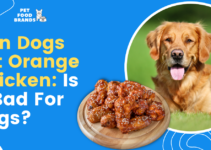Providing the right nutrition at the right age is of utmost importance for everyone, whether humans or dogs. Since at different stages of life, nutritional needs also change. Maybe you already have a dog and got another pup and now wondering whether they can share food or not.
Well, I wish that were possible since that would have made our job as dog owners a lot easier, but you should not do that. Now Im not saying that adult dog food is deadly for a puppy; of course, if you have rescued a pup and only have adult dog food at your disposal, you can feed them that once. But that should not continue.
Feeding puppies the wrong food can lead to allergies and digestive issues, affecting their health. So keep reading as I discuss whether puppies can eat adult dog food.
Is Adult Dog Food Safe for Puppies?
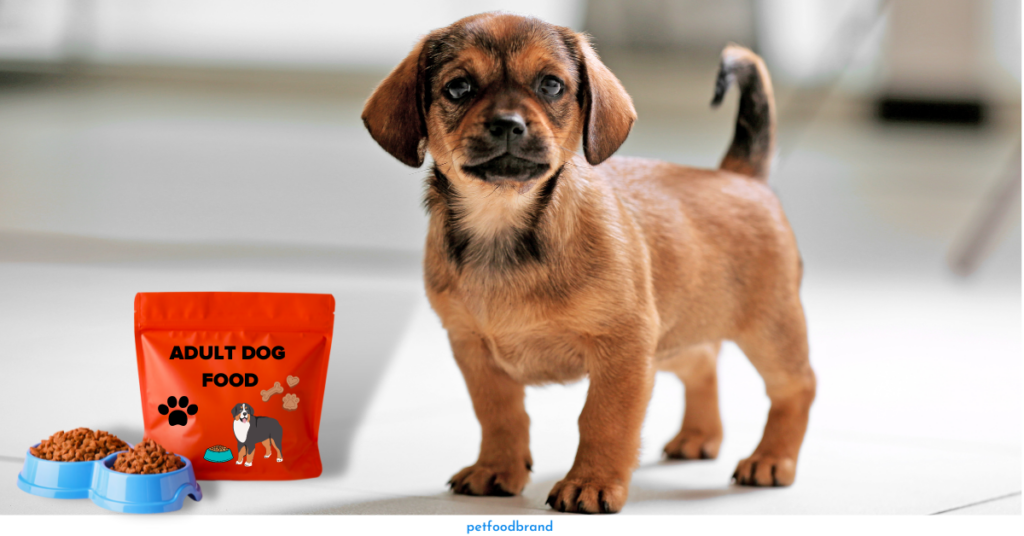
Adult dog food is safe for puppies since, at the end of the day, it is food made for dogs. But you still should not feed puppies dog food that is explicitly made for adults.
To give an analogy, chocolates aren’t harmful to us. However, we avoid giving them to infants or newborn babies due to a lot of reasons, like- they can cause digestive issues, can become addictive, and might hamper their sugar tolerance in the longer run, or maybe promote the growth of ringworms. Chocolates are not deadly for babies, yet we avoid giving them until they reach a certain age.
Similarly, generic dog food is not harmful to puppies but might have adverse reactions in the long run. Especially if the puppy is a newborn, it should either stick to breastfeeding (up to 10 weeks) or be given formulas that match its nutritional needs.
You can switch to adult food when your puppy’s growth needs more protein and nutrition. However, maturity depends on dog breeds, so when your puppy is nearing adult height, you can start feeding them adult food.
For small breeds, 9-12 months should be the ideal time to add adult food to their diet, whereas for large breeds, the time is 18 months.
Feeding your puppy adult food can harm their digestion, but it takes merely a week to 10 days to get accustomed to the new food while they are maturing.
But abruptly changing the food can cause your puppy to have health issues like diarrhea, vomiting, or lack of appetite. So, the process should be slow and steady, and we advise you to start with 25% adult food mixed with their puppy food.
Below we have discussed what is best for your puppy before they are in the transitioning time.
What Can Puppies Eat?

The AAFCO suggests feeding guidelines for dogs, where they have divided canines based on different factors like life stages (puppy, adult, senior) or health needs. According to them, there are two nutrients that are a must when choosing the right dog food for your puppy.
For a puppy, the two most important things are growth and reproduction. For a puppy’s growth, nutrients should be 22-32% protein, 10-25% fast, 0.7-1.7% calcium, and 20% digestible carbohydrates. Therefore, whatever diet or dog food they are given should cater to this nutrition profile.
Apart from that, as dog owners, we all know that we can’t give them human food, be it a puppy or an adult dog, since things like dry fruits, milk/dairy, chocolate, sweets, certain fruits, etc. might meet the caloric needs but are toxic for dogs.
If their food doesn’t have enough calories, it can hinder their growth, immune system, and overall development.
However, if you aren’t able to find dog food that is made for puppies, at least look for recipes that are labeled as “suitable for all life stages.” in that case, you can be assured that it has at least 80% of the formula required for a puppy’s healthy growth.
What are the Effects of Giving Adult Dog Food to Puppies?
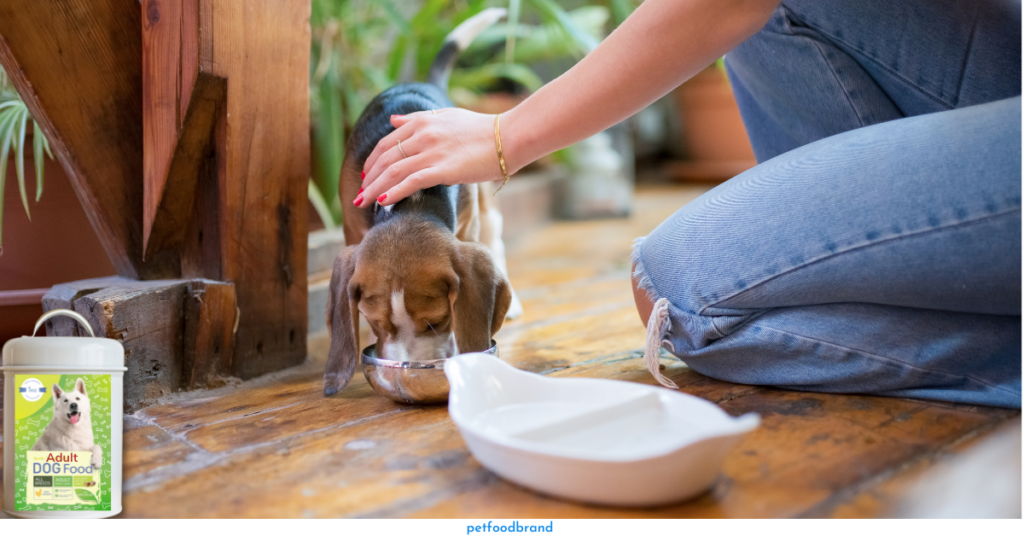
If you still don’t understand the side effects of feeding puppies exclusive adult dog food, then take a quick look here. These are the health issues a puppy can face if given adult food from an early age.
1. Nutritional Imbalance
Adult dog food is not formulated to meet the specific nutritional needs of growing puppies.
Puppies need higher protein levels, fat, calcium, phosphorus, and other essential nutrients to support their rapid growth and development.
Feeding them adult dog food can lead to nutrient deficiencies and imbalances, affecting their overall health and development.
2. Hindered Development
The lack of the right nutrients in adult food can cause development issues in puppies. Common problems include improper bone development, joint issues, stunted growth, etc.
All this happens as adult dog food might have all the nutrients required for adult dog maintenance but lacks the parts especially needed for growth.
3. Upset Stomach
Just like babies or any other newborn, puppies also have a delicate digestive system. In that case, giving them adult dog food can cause upset stomachs, and vomiting, or can even cause food allergies.
It is because adult dog food may be too rich or difficult for puppies to digest properly, leading to diarrhea, vomiting, and other gastrointestinal problems.
4. Weight Issues
Since puppies require growth-promoting factors, their diest should always be high caloric, which isn’t very common in adult dog food. Adult dog food is usually formulated so your dog doesn’t get obese, which means they are not high in calories.
Therefore, feeding your puppy adult dog food, which may have lower caloric density, can lead to weight loss, malnutrition, or failure to thrive.
5. Dental Problems
Different ages have different requirements; for puppies, their food must support teeth and bone development. It means the formula should help them to absorb calcium better. But in adults, that’s not a priority. Hence the recipes don’t stress that.
As a result, if you keep giving your puppy adult dog food, it might not provide the appropriate dental support, potentially leading to dental issues like brittle teeth and weak gums.
Why do Puppies and Adults Need Different Food?
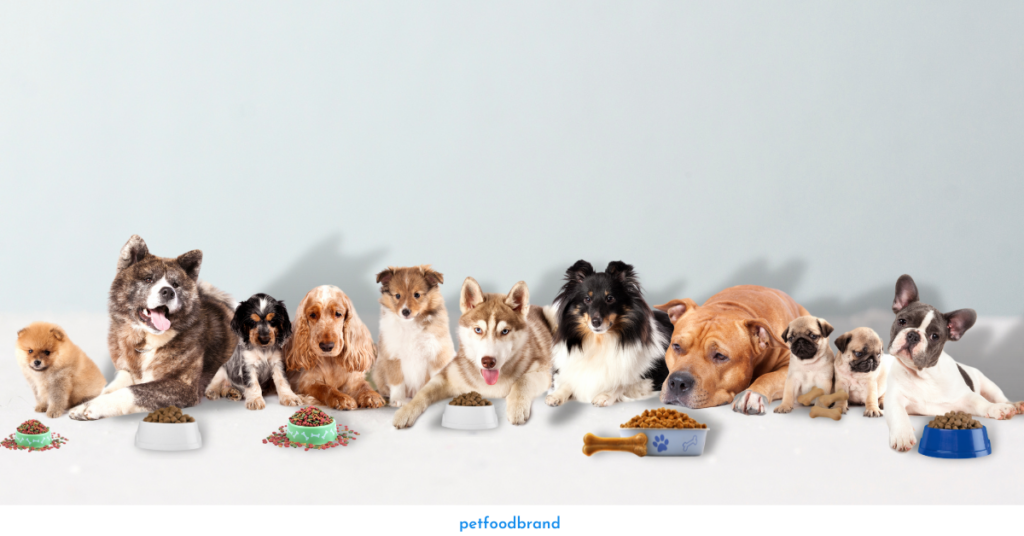
As I said earlier, canines have different nutritional requirements at different stages of their lives. When they are a puppy, their body focuses on growth; when they are adults, the focus shifts to maintaining that growth and building strength.
So here are the main reasons why puppies and adult dogs must be fed different recipes.
1. Different Growth and Development
Compared to adult dogs, puppies are in a growth phase, so their meal requires nutrients that correctly support bones, muscles, organs, and tissue development.
Whereas adult dogs have finished that phase and need a diet suitable for maintaining what they have while serving their daily energy needs. Adult foods shouldn’t be fed nutrients to avoid excessive growth.
2. Different Caloric Requirements
Since puppies are in a growth phase, they need more calories per pound of their body weight than adults. Puppies are more playful and exploratory, so their body demands more calories.
Besides super athletic dogs, regular adult dogs aren’t that active, so their food doesn’t need too many calories.
3. Protein Needs
Puppies and adult dogs have different protein requirements. Due to higher calorie requirements, puppies require more protein than adult dogs. Protein helps support the rapid growth and development of tissues in young puppies.
4. Calcium and Phosphorus Levels
It would help if you gave your pet a balanced diet. Elements like calcium and phosphorus are age sensitive. Meaning their requirement for food is different at different ages.
So clearly, the amount of calcium and phosphorus that an adult dog food would have will not match the requirements for a puppy, which can lead to skeletal problems or growth deformities.
5. DHA and Other Brain Development Requirements
Puppies need adequate docosahexaenoic acid (DHA) levels for healthy brain and vision development. DHA is an omega-3 fatty acid commonly found in puppy-specific foods. In contrast, adult dog food doesn’t need this nutrient.
6. Digestive and Immune System Support
Both in the case of the digestive system and immune system, puppies are more sensitive than adult dogs. Therefore, their diet must-have elements to support them in those cases.
Failing to do so can hamper their digestive and immune system, resulting in problems like food sensitivity or prone to infections and diseases.
FAQ’s
How often should I be feeding my puppy?
If your puppy is younger than four months, it would need small meals throughout the day and night, and you can keep a gap of three hours in between. From the age of four to six months, you can feed them thrice a day and, after six months, twice a day, both with a regular gap.
When Should You Start Feeding Your Puppy Adult Food?
The answer depends on many factors, like their breed size, activity level, and spaying and neutering. For small breeds, you can start giving adult food at 10-12 months; for medium size, it’ll be 12-14 months; for larger breeds (over 50 pounds), it can vary between 14-24 months.
On that note, keeping your dog on puppy food for longer can be beneficial if your dog is super athletic.
How often do puppies poop?
Puppies digest their food quickly since their digestive tract isn’t long. So it is common for puppies to poop 5 to 6 times a day.
Final Thoughts
While an occasional small amount of adult dog food may not cause immediate harm, you must avoid making it a regular part of your puppy’s diet. Besides, due to their different needs and requirements, feeding puppies a specially formulated puppy food labeled as “complete and balanced” for their life stage is crucial.
Instead, give them high-quality, commercially prepared puppy food specifically formulated to meet their unique nutritional needs as puppy food s designed to meet the specific nutritional requirements of growing dogs, promoting healthy development and setting the foundation for a long and active life.

Ankita is a passionate pet lover and head of content at Pet Food Brands. With her extensive knowledge and research, she provides pet owners with top-quality information on dog food and nutrition. Her dedication to improving the lives of dogs makes her a leading voice in the industry.

